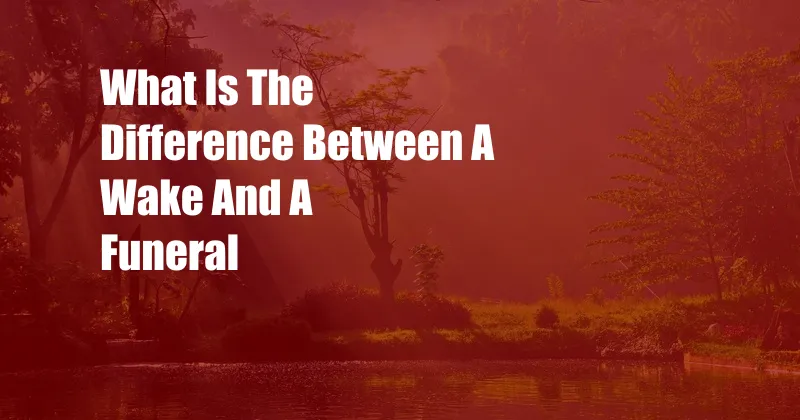
Understanding the Differences: Wakes vs. Funerals
Death is an inevitable part of life, and when it occurs, our culture has developed customs and traditions to help us cope with the loss and honor the deceased. Two common practices are wakes and funerals, but many people are unsure of the distinctions between them. This article will delve into the nuanced differences between these two important ceremonies.
Wakes: A Vigil for the Departed
Wakes are gatherings held before a funeral service, typically at the funeral home or the deceased’s residence. They are a time for family and friends to come together, pay their respects, and share memories of the loved one who has passed away. Wakes often include prayers, music, and the opportunity for attendees to visit with the family.
In some cultures, wakes are an all-night affair where people take turns staying awake by the body of the deceased, known as a “wake over.” This tradition is rooted in the belief that staying with the departed helps guide their spirit into the afterlife. Today, wakes are more commonly held for a few hours, allowing mourners to gather and share their condolences.
Funerals: A Farewell Service
Funerals, on the other hand, are formal services that mark the final farewell to the deceased. They are typically held at a church, funeral home, or cemetery and are officiated by a religious or spiritual leader. Funerals often include readings from religious texts, prayers, eulogies, and music.
The purpose of a funeral is to provide a structured and meaningful way for family and friends to mourn their loss, celebrate the life of the deceased, and gain closure. After the service, the body is typically buried or cremated, depending on the wishes of the deceased and their family.
Differences between Wakes and Funerals
While wakes and funerals share some similarities, there are several key differences between them:
- Timing: Wakes are held before the funeral service, while funerals take place after the wake.
- Purpose: Wakes are more informal gatherings focused on sharing memories and paying respects, while funerals are more formal services designed to provide a structured farewell.
- Attendees: Wakes typically have a more relaxed atmosphere and may include a wider range of attendees, including friends and acquaintances. Funerals, while still open to the public, may have a more restricted guest list.
- Ceremony: Wakes usually include prayers, music, and open visiting, while funerals follow a more structured format with readings, eulogies, and a formal procession.
- Location: Wakes are often held in the funeral home or the deceased’s residence, while funerals are typically held at a church, funeral home, or cemetery.
Tips and Expert Advice
Navigating the nuances of wakes and funerals can be emotionally challenging. Here are some tips to help you make the most of these experiences:
- Be respectful: Remember that these events are for the deceased and their loved ones. Respect the customs and traditions associated with the ceremony.
- Offer support: If you are attending a wake or funeral, be sure to offer your condolences to the family and share your memories of the deceased.
- Follow the lead: When attending a wake or funeral, observe the tone and atmosphere of the event. Follow the guidance of the family and funeral home staff.
- Dress appropriately: Wakes and funerals typically have a more formal dress code, so it is best to err on the side of caution and dress respectfully.
- Bring a gift: Sending flowers or a sympathy card to the family is a thoughtful gesture to express your support.
FAQs on Wakes and Funerals
-
Do I have to attend a wake or funeral?
Attendance at wakes and funerals is optional, but it is considered a respectful way to show support for the family and honor the deceased. -
What should I wear to a wake or funeral?
Most wakes and funerals have a more formal dress code, so it is best to dress respectfully. Dark, muted colors are generally appropriate. -
Can I take photos at a wake or funeral?
It is generally considered disrespectful to take photos at a wake or funeral unless you have explicit permission from the family. -
What should I say to the family?
When offering condolences to the family, keep it simple and sincere. Avoid using clichés or platitudes. Instead, focus on sharing memories of the deceased and expressing your support.
Conclusion
Understanding the differences between wakes and funerals can help you navigate these important events with respect and empathy. Wakes provide a time for family and friends to gather, share memories, and pay their respects. Funerals, on the other hand, offer a structured and meaningful farewell to the deceased. By respecting the customs and traditions associated with these events, you can support the bereaved and honor the memory of the loved one who has passed away.
Are you interested in learning more about cultural traditions surrounding death and mourning?